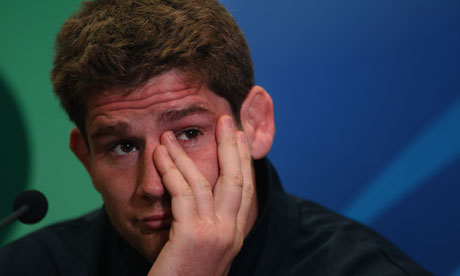
Ask six French people what was going on at the end of the pool stages, when their team lost to New Zealand and Tonga, and you receive six different answers. The French have a thousand takes on the mutiny, the moment Marc Lièvremont was asked to leave the huddle, and the revival and the victory over England.
There was only one certainty in it all, and that was the necessity to find a motivational trigger. French players do not give every game of their working lives their best shot. Playing away from home is often more an exercise in disguising their indifference than making a genuine effort to claim a victory on the road.
Accepting one defeat was easy, especially when it became the perceived wisdom in the travelling circus that to win the World Cup France only needed to beat New Zealand the once. They might as well save it for the final. To lose then to Tonga was awkward and embarrassing, but perhaps only because it meant that to reanimate the French spirit would require a more radical thrust. A sullen mutiny, a rejection of management authority and fierce introspection by the players worked a treat.
The French are conscious that the more drastic the action, the more likely a counter-reaction. They beat England, but now fear the slump that followed their epic performances against New Zealand in 1999 and 2007. They did not turn up for the final in Cardiff 12 years ago, and England made a mess of them in Paris, at their very own party four years ago.
How to do things differently this time? They cannot turn on the same animosity that always ignites them when they face England, their traditional tormentors, because, to be honest, they quite like the Welsh. They like the way the Welsh play; it's like the French way, except France are bigger and richer and stronger.
So, how do they go about pumping themselves up for this semi-final? Two days before the match, it appears they are not yet sure. Imanol Harinordoquy, Pascal Papé, David Marty and Morgan Parra plonked themselves before the media and gave an impression of insouciance, sharing sweets and throwing one to a reporter who asked what they were eating.
They gave all the right answers about respecting the mobility of the Welsh forwards, the style of their play and their rediscovery of form at the World Cup, but they were going through the motions. How could they take this match too lightly? This was the semi-final of the World Cup; they don't come around very often. But it was easily delivered. France were relaxed.
But then somebody asked Papé about how not so many months ago he was only one of so many second rows in contention for a place in the team. What efforts had he made to go from there to being the one now in the starting line-up?
"La question est pourrie [rotten]," said the big man. Saturday was all that mattered. The contempt was obvious.
Harinordoquy was asked a question too far in English. "Ça suffit en anglais," he said. A minute or two later he rose and left.
Do you like leeks, Pascal? Pause. Incredulity. "I do not like leeks," said Pascal.
"Maybe it's not the moment to be talking about cooking," said Emile Ntamack, France's assistant coach. It helped, but a chill had descended.
France need to be relaxed and they need to be stoking their fires. Whatever it takes. They cannot do mutiny again, for that would be unconvincing and, heaven forbid, repetitious. And while they're working out the details of the formula, they are an odd soup of cool and piquant. It's OK, but they're going to have to bring it to the boil, because how France cook themselves is precisely what this semi-final is all about.

